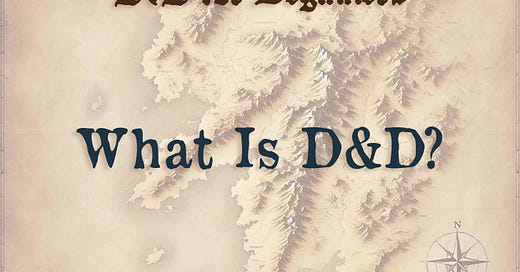Right off the bat, “D&D” is short for a role-playing game called Dungeons & Dragons.
Dungeons & Dragons is a “game” in the sense that there are some (often quite loose) rules, but it’s not game you can win or lose.
It’s more like a group Choose Your Own Adventure book where there are choices at the end of each page and how the story plays out depends on what choices are made.
You and your friends play as adventurers in a fantasy world with magic, monsters, and piles of treasure. One player acts as the storyteller and referee and guides the game along—called the dungeon master or DM—and the other players control the main characters in the story.
How Do You Play D&D?
You don’t need a board though, depending on what your group likes, you can play with a kinda-sorta “board.” Instead, D&D is played through conversation, imagination, and dice rolls. Lots and lots of dice rolls.
First, you bring a character to life on paper.
Pick your character’s race—human, elf, dwarf, or a gazillion others
Pick your character’s class—a fighter, wizard, or rogue, for example
Dice rolls determine your character’s attributes, like strength or wisdom.
Then give them a background. Maybe they’re a retired smuggler. Maybe they’re a bored noble. Or even a gong farmer—look that up for an eww moment—who wants to become a folk hero.
After that, the DM—the storyteller player—describes the scenario.
DM: "You hold your breath and slowly creep into a dark cave. The air feels damp and smells of rotten meat. You hear something breathing nearby…"
Then you decide what your character will do.
YOU:
"I draw my sword and step forward."
"I keep sneaking ahead to see what’s in there."
"I yell back to the group, ‘HEY, Y'ALL, I THINK SOMETHING'S IN HERE!’"
You roll dice, and the DM describe what happens next.
Most role-playing games, including D&D, use a variety of oddly shaped dice. The specifics we can get into another time. The gist is (usually) the higher number you roll, the more successful at whatever you were trying to do. But roll low, and… well, let’s hope you made a Plan B.
And that’s it.
That is D&D.
Simple, right?
Why Is It So Fun?
D&D is fun because, unlike video games or board games, you can try to do anything you can dream up, as long as the DM—remember, they are also the referee—allows it.
Total freedom. No set paths, no pre-written dialogue options—just pure imagination. Want to bribe a dragon with an omelet? Go for it. Want to convince the king you’re his long-lost cousin? Try it.
Unpredictability. The dice determine your fate. A perfect plan can fall apart because you rolled a 1… or the dumbest idea ever can somehow work because you rolled a 20.
Hilarity ensues. Someone will inevitably make a terrible decision—like yelling “Hey, y’all, I think something’s in here”—and the entire table will groan, laugh… or utterly panic.
Teamwork — or (friendly) betrayal. Work together, save each other’s asses, and sometimes fill that damn bard’s annoying kazoo with goblin poop while they sleep.
So the “game” of D&D isn’t about winning or losing at all. It’s all about you and your friends hanging out for a few hours and living a great story together.
Will you end up a folk hero or a complete disaster? Well, that’s up to you and the dice.
Subscribe and let ol’ Professor Crackfang teach you the basics. Then grab some friends, order some pizza, roll some dice, and start your first adventure.
You won’t regret it.
-- Professor Richard Crackfang, A.W.E. (Arcane Wizard Extraordinaire)



